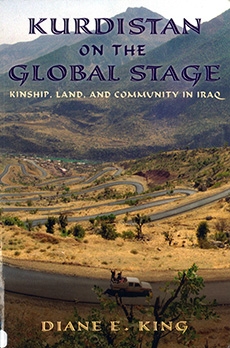
Kurdistan on the Global Stage
Diane E. King
Rutgers University
“A rare account by an anthropologist of uncommon courage, this unique analysis of the rapid transformation of Iraqi Kurdistan is a must-read for students and scholars of the Middle East.”
—Marcia C. Inhorn, Yale University
Anthropologist Diane E. King has written about everyday life in the Kurdistan Region of Iraq, which covers much of the area long known as Iraqi Kurdistan. Following the overthrow of Saddam Husseins Bathist Iraqi government by the United States and its allies in 2003, Kurdistan became a recognized part of the federal Iraqi system. The region is now integrated through technology, media, and migration to and from other parts of the world.
Focusing on household life in Kurdistan’s towns and villages, King explores how residents connect socially, particularly through patron-client relationships and as people belonging to gendered categories. She emphasizes that patrilineages (male ancestral lines) seem well adapted to the Middle Eastern modern stage and vice versa. Old values may be maintained, reformulated, or questioned. King offers a sensitive interpretation of the challenges resulting from the intersection of tradition with modernity. Honor killings still occur when males believe their female relatives have dishonored their families, and female genital cutting endures. Yet, this is a region where technology has spread and seemingly everyone has a mobile phone. Households may have a startling combination of nonliterate older women and educated young women. New ideas about citizenship coexist with older forms of patronage.
King is one of the very few scholars who conducted research in Iraq under difficult conditions during the Saddam Hussein regime. How she was able to work in the midst of danger and in the wake of genocide is woven throughout the stories she tells. Kurdistan on the Global Stage serves as a lesson in field research as well as a valuable ethnography.
Diane E. King is an assistant professor of anthropology at the University of Kentucky. She is the editor of the volume Middle Eastern Belongings (2010; paperback edition, 2013) as well as scholarly articles and journalism on collective identity, kinship and descent, gender, and the state. Since 1995, she has been conducting ethnographic fieldwork in the Kurdistan Region of Iraq. Her Ph. D. (2000) is from Washington State University. She previously taught at Washington State University and the American University of Beirut. Her research has been supported by her employers and by the Wenner-Gren Foundation, the Hewlett Foundation, the Howard Foundation (of Brown University), and the British Council. | 